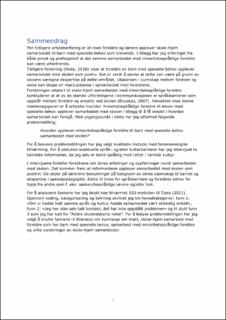| dc.description.abstract | Min tidligere arbeidserfaring er at noen foreldre og lærere opplever skole-hjem
samarbeidet til barn med spesielle behov som krevende. I tillegg har jeg erfaringer fra
både privat og profesjonelt at det samme samarbeidet med minoritetsspråklige foreldre
kan være utfordrende.
Tidligere forskning (Reite, 2018) viser at foreldre av barn med spesielle behov opplever
samarbeidet med skolen som positiv. Det er verdt å nevne at dette kan være på grunn av
skolens særegne ekspertise på dette området. Ubalansen i kunnskap mellom forelder og
skole kan skape en maktubalanse i samarbeidet med foreldrene.
Forskningen relatert til skole-hjem samarbeidet med minoritetsspråklige foreldre
konkluderer at et av de største utfordringene i kommunikasjonen er språkbarrieren som
oppstår mellom foreldre og ansatte ved skolen (Bouakaz, 2007). Hensikten med denne
masteroppgaven er å utforske hvordan minoritetsspråklige foreldre til elever med
spesielle behov opplever samarbeidet med skolen i tillegg til å få innsikt i hvordan
samarbeidet kan foregå. Med utgangspunkt i dette har jeg utformet følgende
problemstilling;
Hvordan opplever minoritetsspråklige foreldre til barn med spesielle behov
samarbeidet med skolen?
For å besvare problemstillingen har jeg valgt kvalitativ metode med fenomenologisk
tilnærming. For å utelukke eventuelle språk- og/eller kulturbarrierer har jeg intervjuet to
tamilske informanter, da jeg selv er tamil språklig med røtter i tamilsk kultur.
I intervjuene forteller foreldrene om deres erfaringer og oppfatninger rundt samarbeidet
med skolen. Det kommer frem at informantene opplever samarbeidet med skolen som
positivt. De stoler på lærerens beslutninger på bakgrunn av deres kjennskap til barnet og
ekspertise i spesialpedagogikk. Dette til tross for språkbarriere og foreldres behov for
hjelp fra andre som f. eks: søsken/tospråklige lærere og/eller tolk.
For å analysere funnene har jeg brukt noe tilnærmet SDI-metoden til Tjora (2021).
Gjennom koding, kategorisering og tolkning utviklet jeg tre hovedkategorier; funn 1:
«Om vi hadde hatt samme språk og kultur, hadde samarbeidet vært skikkelig enkelt»,
funn 2: «Jeg har ikke selv tatt kontakt, det har ikke oppstått problemer» og til slutt funn
3 som jeg har kalt for “Andre skolerelaterte roller”. For å belyse problemstillingen har jeg
valgt å knytte funnene til litteratur om kunnskap om makt, skole-hjem samarbeid med
foreldre som har barn med spesielle behov, samarbeid med minoritetsspråklige foreldre
og ulike vurderinger av skole-hjem samarbeider. | |
| dc.description.abstract | My previous work experience is that some parents and teachers experience the schoolhome cooperation for children with special needs as demanding. I also have both private
and professional experience that the same collaboration with minority-language parents
can be challenging.
Previous research (Reite, 2018) shows that parents of children with special needs
experience the collaboration with the school as positive. It is worth mentioning that this
may be due to the school's distinctive expertise in this area. The sometimes distinctive
imbalance in knowledge between parents and the school can lead to a an imbalance of
power in cooperation with parents.
The research related to school-home cooperation with minority language parents
concludes that one of the biggest challenges in the communication is the language
barrier that arises between parents and staff at the school (Bouakaz, 2007). The purpose
of this thesis is to explore how minority-language parents of pupils with special needs
experience the collaboration with the school, in addition to gaining insight into how the
collaboration can take place. Based on this, I have designed the following problem;
How do minority-language parents of children with special needs experience the
cooperation with the school?
To answer the problem, I have chosen a qualitative method with a phenomenological
approach. In order to rule out any language and/or cultural barriers, I have interviewed
two Tamil informants, as I myself am Tamil speaking with roots in Tamil culture.
In the interviews, the parents talk about their experiences and perceptions regarding the
collaboration with the school. It appears that the informants experience the collaboration
with the school as positive. They trust the teacher's decisions based on their knowledge
of the child and expertise in special education. This despite the language barrier and
parents' need for help from others such as siblings/bilingual teachers and/or interpreters.
To analyze the findings, I have used something close to the SDI method of Tjora (2021).
Through coding, categorization and interpretation, I developed three main categories;
result 1: "If we had the same language and culture, the collaboration would have been
really easy", result 2: "I have not made contact, there hasn't been any problems" and
finally result 3 which I have called "Other school-related roles". To shed light on the
issue, I have chosen to link the findings to literature on knowledge about power, school- home collaboration with parents who have children with special needs, collaboration with
minority-language parents and various assessments of school-home collaboration. | |
